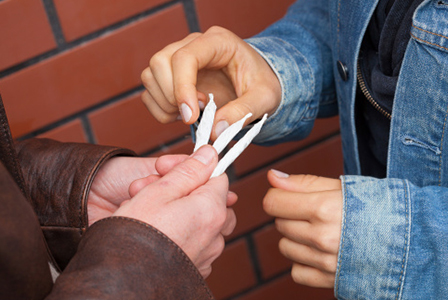Drugs affect teens regardless of gender, race or income level. It doesn’t matter how well you’ve raised your kids — illicit substances and the intense social pressure teens experience can still influence their lives.
Drugs aren't picky, know the signs
by Zeynep Ilgaz
As a parent, your most powerful tool is information. Knowing which drugs are available to teens, as well as the warning signs of drug abuse, is the first step to keeping drugs out of your home. Once you’re informed, you’re ready to talk to your kids about drugs.
Drug use on the rise
Teens are growing increasingly accepting of marijuana, according to the 2013 study by Monitoring the Future, an annual survey of teen substance abuse behavior sponsored by the National Institutes of Health.
Among high school seniors, less than 40 percent view regular marijuana use as harmful, and 36 percent reported using it at least once in the past year. And it starts young — more than 12 percent of eighth graders reported using marijuana in the past year.
A full 40 percent of seniors have used some kind of illicit drug in the past year, while 32 percent of tenth graders and 15 percent of eighth graders reported doing the same.
What are they taking? Teens report using synthetic marijuana, unauthorized prescription drugs (e.g., Adderall, Oxycodone, and Vicodin), inhalants, ecstasy (and its recently popular relative, MDMA, or “Molly”), hallucinogens, bath salts, cocaine and heroin.
Teens may acquire these drugs at parties, through their friends or online via social networking sites. And, of course, free time after school is dangerous for kids who have nothing to do. Often, teens start using drugs to seem cool (rarely with the intention of harming their bodies), so keeping an eye on the crowd your teen hangs out with after school is important.
Know the signs
It can be hard to know whether teens are using drugs, but if they are, it’s absolutely vital to get them help as quickly as possible. Here are a few warning signs to look for if you suspect your teen has used drugs.
Physical signs
- Bloodshot or red eyes
- Unexplained bruises
- Slurring or difficulty speaking
- Sudden changes in appearance or weight
- Sudden lack of attention to hygiene
- Changes in sleep patterns or abnormal fatigue
- Persistent coughing
Social signs
- Lack of interest in activities they normally enjoy
- Disassociation from friends or hanging out with a new social group
- Falling grades
- Truancy or sneaky behavior
- Frequently staying out late or leaving for extended periods of time
- Sudden anger or agitation when asked about behavioral changes
- Avoiding eye contact
Emotional signs
- Abnormally aggressive or argumentative responses
- Depression or withdrawal from social activities
- Irritability
- Lack of judgment
Behavioral signs
- Abnormal odor on breath or clothing
- Prescription medications, alcohol or money disappearing from the household
- Failure to meet responsibilities at work, school or extracurricular activities
- Notification from a teacher, coach or employer of abnormal behavior
- Possession of drug paraphernalia
Any of these may indicate a problem, but be especially wary if you spot a combination of these warning signs in your teen.
Originally from Turkey, Zeynep Ilgaz and her husband immigrated to the United States with nothing but two suitcases, a love for each other and a desire for entrepreneurship. They co-founded Confirm BioSciences and TestCountry, where Ilgaz serves as president. As the global leader in the field of lab and instant testing for drugs of abuse and health, Confirm BioSciences is committed to being on the cutting edge of offering new, service-oriented drug testing technologies.
More on teens and tweens
College students: The new poor?
Should your teen wait to start college?
Dangerous tween trend: Snorting Smarties
